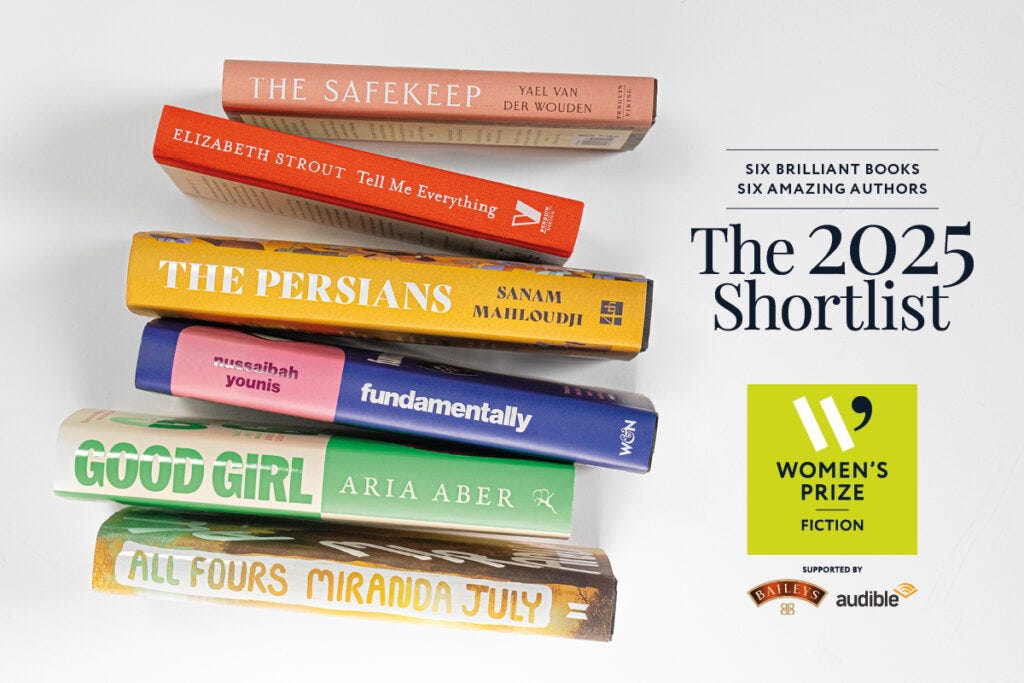Meta isn’t just stealing books, it’s trying to silence them
The fight for creative rights, the 2025 Women’s Prize shortlist and A Little Life turns 10
Some weeks the news around books feels unusually full. Full of headlines, conversation and stories that spark something bigger. Normally this is joyful: the best books of the year, the biggest book drop, news from London Book Fair.
This week, the name on everyone’s lips seems to be Meta. We’ve seen banning books in the US, now we’re seeing direct tech influence in stealing and silencing them.
Still, it’s also been the week of the shortlist announcement for the wonderful Women’s Prize for Fiction. If you are looking for an excuse to soak up some sun in the company of a great read, wow did these judges deliver for us.
Meta isn't just stealing books, it's also trying to silence them
This last month, two big stories have surfaced that continue to unveil the operations and culture at Meta. And both are about books.
Meta has stolen authors works to train their AI
An ex-Meta (then Facebook) employee has written a tell-all of their experience, and has been banned from promoting it or saying anything disparaging about Meta. Which essentially means they cannot comment on said ban
Let’s begin with Careless People, a new memoir by Sarah Wynn-Williams, a former Global Public Policy Director at Meta. Her book is an account of her seven years at the company and it doesn’t flatter. From troubling internal dynamics to cooperation with the Chinese government, it’s an inside look at how Meta (and, indeed, power) behaves behind closed doors. Within days of publishing Meta, using Wynn-Williams’ contract, silenced her promotion of it via an emergency arbitration ruling in the US. Meta dismisses the claims in the book as false, whilst UK publisher Macmillan stands by it’s rigorous editing and fact checking process. But the result is clear, this author has been silenced.
The good news in all of this is that the ruling has created more buzz and noise than your average debut memoir, and you better believe I skipped down to my local bookseller to grab a copy. My social feeds are also covered with the ‘get it before it’s banned’ and ‘the explosive memoir that Meta doesn't want you to read’ advertising of booksellers. Genius.1
Not satisfied with silencing authors’ words, Meta is facing outrage for doing something else: stealing them.
According to reporting from The Atlantic (yes, the same publication who’s editor-in-chief recently published an expose of Trump’s war plans after being accidentally added to their chat group), Meta has taken books to train their AI. With full knowledge that the works were protected by copyright and are, therefore, stolen. Millions of titles were taken without permission, without credit, and without compensation.
Writers are, rightly, furious. Authors, such as Daisy Buchanan, have since written about their experience of their work being stolen and on Thursday The Society of Authors organised a protest outside Meta’s London offices in King’s Cross.2
Books are more than just content. They build our collective history, and connect people through understanding and experience. What’s happening here, and across the world (the quiet theft, the public silencing, the banning of books) strikes at the core of why books matter. And why authors, always, deserve our loud support.
The 2025 Women’s Prize shortlist
In the theme of supporting authors, here’s your reminder that the Women’s Prize for Fiction shortlist was announced this week. It is their thirtieth year of the prize, and remains one of my very favourites. Reading the longlists through lockdowns and discussing them with a group of friends was one of my favourite activities.
The shortlist this year is immediately recognisable:
All Fours by Miranda July - The book of last summer, which had everyone obsessed.
The Safekeep by Yael van der Wouden - Another book you’ll have found hard to escape and a super exciting debut.
Tell Me Everything by Elizabeth Strout - I feel at this point Strout’s writing is a guaranteed entry. She never misses, and her world creation is exemplary. If I was a brand with a big enough budget, she’s the first person I’d turn to help craft story.
Fundamentally by Nussaibah Younis - A biting dark comedy about rehabilitating ISIS women, with excellent reviews.
Good Girl by Aria Aber - A coming of age novel about the daughter of Afghan refugees becoming a young artist in Berlin.
The Persians by Sanam Mahloudji - My fave type of story: a multi-generational familial look at what it means to go from somebody to nobody.
The Women’s Prize for Non-Fiction shortlist was also released last week.
Something new from Verse
If this week’s stories remind us of anything, it’s that books are worth protecting and sharing. Here’s three ways you can get involved:



The Pre-Loved Bookshop
A slower, more sustainable way to discover books. Second-hand, community powered, £4 a title, 15% donated. Visit the shop.
The Books You’ll Love Subscription
Thoughtfully chosen, second-hand books delivered to your door. Less scroll, more soul. Explore the subscriptions.
The Slow Down Book Club
A 10-week reading journey, curated by us. Join the waitlist for the next one.
A Little Life turns 10
I can still remember vividly where I was when I first read A Little Life: on a sunbed whilst living in South Africa, balling my eyes out. It’s almost unbelievable to think that this book, that still feels so very much a part of the conversation today, is now ten years old.
Since it’s release it’s sold a million+ copies, won multiple awards, been turned into a play and continues to hook readers with it’s powerful and heartbreaking portrayal of friendship and love.
To celebrate the anniversary there’s a new edition available to pre-order, and the author is hosting an event at the Southbank Centre in October.
Say goodbye to bad recommendations and hello to a better reading experience 👇














